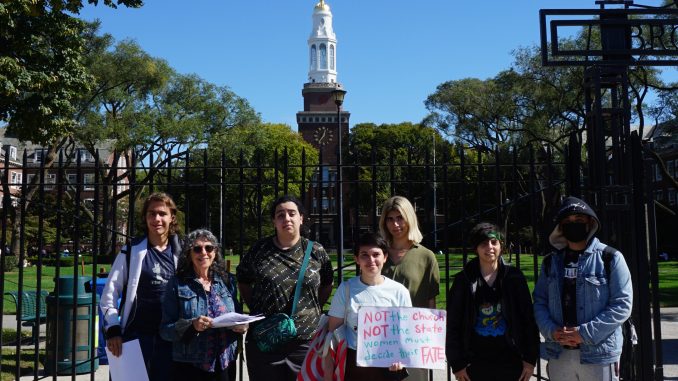
By Gabriela Flores
Brooklyn College, and two other CUNY campuses, rallied in a national walkout for reproductive justice last Thursday, Oct. 06. Students and allies demanded that the university provide free abortion pills at campus health services and fund research on abortion access, among other demands.
“I think it’s important to just recognize that while everyone has a right to their own belief systems and to choose what they want to do with their own lives and their own bodies, you can’t dictate what other people do with their lives and their bodies,” said Sami Binder, a class of 2018 alumnus and staff member who helped organize the rally at BC.
CUNY for Abortion Rights, a group recently founded by Graduate Center students, led the rally for National Student Day of Action for Abortion Rights, where over 40 campuses nationwide advocated for abortion access, trans rights, and bodily autonomy. The Graduate Center, Hunter College, and Brooklyn College joined the effort, with participants later in the day marching to the university’s central office on 42nd Street in Manhattan to vocalize their demands. Participants called for CUNY to provide resources and aid for students in need of an abortion, providing them funding to cover procedural or travel costs, among other demands.
“Without affordable reproductive healthcare, abortion, childbearing people cannot be students. That’s it. It will end their ability to live out a greater life with greater potential, and they’ll have to stop their studies,” said Robin Strauss, a Hunter professor and member of the National Mobilization for Reproductive Justice, who joined the rally at BC.
The abortion rights group called for support for gender-affirming care, which the World Health Organization defines as including social, psychological, and medical interventions designed to “affirm an individual’s gender identity” if it conflicts with their birth-assigned gender. CUNY for Abortion Rights was formed in response to a Supreme Court majority leaked decision earlier this year that stated the overturn of Roe v. Wade, a landmark case that granted abortion rights. Since the case was overturned, 13 states have banned most abortions, with other state courts deciding whether they should impose their own bans or restrictions. New York remains one of the 21states that provides access to legal abortions.
“Abortion is a basic right for people who need it, for people who do not have the means to support a child, for the people who will die if they don’t have it,” said Julia Abusharr, a BC student. “And it’s not just about having it legal in one or two states, it’s about having it legal nationwide so people can have access to it if they can’t afford to go to a whole other state just to have it done.”
Local grassroots organizations like National Mobilization for Reproductive Justice are also rallying to extend safe abortion access. On Sunday, Oct. 16, locals are gathering in the Bronx to continue advocating for reproductive justice and to memorialize Rosie Jimenez, who was the first woman to die from an unsafe abortion in 1977 after an amendment cut Medicaid funding for medically supervised abortions.
“We think it’s essential, especially in a community such as the South Bronx, where so many women are relying on resources for reproductive care,” said Strauss. “There’s such an inequality, class-wise, in terms of who’s gonna get access to services.”
As of press time, CUNY has not released a response to the rallies and demands.
